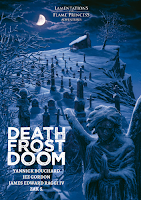27. What are your essential tools for good gaming?
Answer: I'll answer an alternate question as the answer to this standard one is so straightforward. For me, the essential tools for good gaming are simple: core rulebooks and any other necessary supplements, dice, paper, pencils, a quiet enough place, and respectful people excited and committed to play a game. A lot of people use digital apps which can be convenient, but they're not essential.
Alternate question: How far from human do you enjoy getting the chance to be in an RPG?
Answer:This is an intriguing question for me because as a player back in the day I always liked to play demi-humans, particularly elves (yeah, I was one of those). Since then, I've come around to the idea of all-human fantasy game either along the lines of an historical, real-world Earth (a la LotFP) or an approximation of Hyperborea. Although demi-human characters have always interested me, there's always been a line I wasn't willing to cross.
Half-elves were certainly okay, and even gnomes were acceptable. However I found things like half-orcs or half-ogres distasteful, and not just because I was forced to imagine that horrific coupling. In later editions, when things like Tieflings and Dragonborn PCs became canon to D&D, I actually became offended. Even my current favorite RPG, Basic Fantasy, includes supplemental races like the Minotaur-like Bisren, the dog-man Caneins, turtle-ish Kappa, Faun, and Gelfling-ish Phaerim. I ignore all of these supplemental races since I'm free to take them or leave them although Fauns and Phaerim hold a certain charm for me, but really mostly as NPCs.
The problem with potentially opening up characters to be any race they want is that it immediately creates a crisis of balance. Game balance has become a buzzword for RPGs over the last couple of decades, something that they strive to maintain at all costs. While game balance isn't that high of a priority for me, having different character races of varying power creates a disparity that causes problems.
Non-human characters generally are given special abilities to highlight their extra-human otherness. When you have a game where humans and non-humans are both options to play, and the non-humans have special powers without some balancing restrictions, who would want to play a human? Older versions of D&D sometimes dealt with this (clumsily) by imposing class-restrictions or level-limits on demi-humans with the justification that human beings are more adaptable and learn quicker. This was never very satisfactory for most players, particularly those who wanted options to play non-humans and get extra powers without any downsides. Modern RPGs have solved the issue somewhat by making all character super-powered no matter what the race. Basic Fantasy handles this dilemma by having some class-restrictions, but no level limits, and giving humans a +10% to all experience earned (again, the adaptability reasoning). It's not perfect, but it's reasonable.
What's funny is that this is not a new problem. It's something that the original version of D&D opened up in the 1974 version when it talked about allowing characters to be non-standard races, even dragons. While one could run a campaign of all dragons, having a campaign where one player runs a 1st-level human fighter and another runs a 1st-level young, red dragon doesn't make much sense. That's an inequality that will break the game. So, for my answer, I'm comfortable playing a non-human, but only to a point.
Subscribe to:
Post Comments (Atom)
GM Notes - Morgansfort Session 14 - Death Frost Doom - Part 2 of 2
So, here stands the final chronicle of my two-year Basic Fantasy campaign. It ended a year ago and I'm just now getting around to fini...

-
Jeff Easley's BECMI Thief I’ve recently decided to run an OD&D game. This, of course, brings with it the age-old question of whi...
-
It is around 11:30 p.m. Father Thelbain acts quickly and has his acolytes clean up the remains of the dead, mute cultist, Brother Malach...
-
So, here stands the final chronicle of my two-year Basic Fantasy campaign. It ended a year ago and I'm just now getting around to fini...




No comments:
Post a Comment